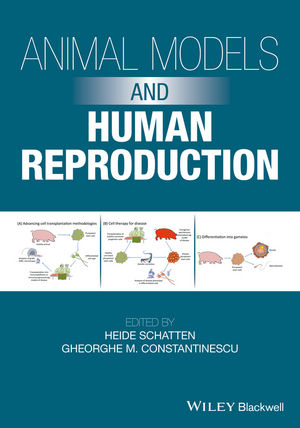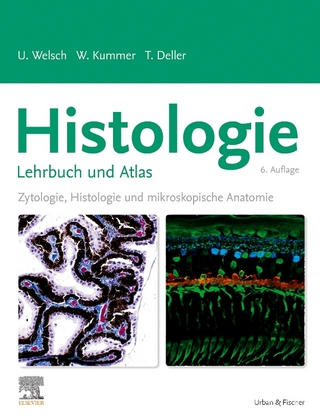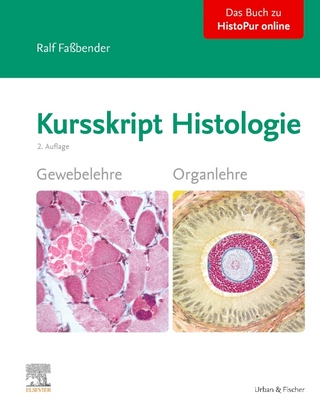
Animal Models and Human Reproduction
Wiley-Blackwell (Verlag)
978-1-118-88160-6 (ISBN)
- Titel z.Zt. nicht lieferbar
- Versandkostenfrei innerhalb Deutschlands
- Auch auf Rechnung
- Verfügbarkeit in der Filiale vor Ort prüfen
- Artikel merken
Animal Models and Human Reproduction presents a comprehensive reference that reflects the latest scientific research being done in human reproductive biology utilizing domestic animal models. Chapters on canine, equine, cow, pig, frog, and mouse models of reproduction reflect frontier research in placental biology, ovarian function and fertility, non-coding RNAs in gametogenesis, oocyte and embryo metabolism, fertilization, cryopreservation, signal transduction pathways, chromatin dynamics, epigenetics, reproductive aging, and inflammation. Chapters on non-human primate models also highlight recent advancements into such issues as human in vitro fertilization (IVF) and assisted reproductive technologies (ART).
This book offers animal scientists, reproductive biology scientists, clinicians and practitioners, invaluable insights into a wide range of issues at the forefront of human reproductive health.
About the Editors Heide Schatten Department of Veterinary Pathobiology, University of Missouri-Columbia, Columbia, USA Gheorghe M. Constantinescu Department of Biomedical Sciences, University of Missouri-Columbia, Columbia, USA
List of Contributors xv
1 Anatomy of the Reproductive System 1
Gheorghe M. Constantinescu
1.1 Male Genital Organs in Domestic Mammals 1
1.2 Female Genital Organs in Domestic Mammals 5
1.3 The Genital System in Domestic Mammals Species by Species 9
1.4 Genital Organs in Laboratory Mammals 35
References 56
2 Anatomy of Mammalian (Endocrine) Glands Controlling the Reproduction 59
Gheorghe M. Constantinescu
2.1 The Hypothalamus Including the Hypophysis 59
2.2 The Cerebral Epiphysis 61
2.3 The Thyroid Gland 61
2.4 The Adrenal Glands 62
2.5 The Sexual Glands 63
2.6 The Liver 63
References 63
3 Models for Investigating Placental Biology 65
Laramie Pence and Bhanu P. Telugu
3.1 Introduction 65
3.2 Classification of Placenta 66
3.3 Development of Human Placenta 69
3.4 Modeling Placental Development and Diseases of Placental Origin 73
3.5 Summary 82
References 82
4 Early Developmental Programming of the Ovarian Reserve, Ovarian Function, and Fertility 91
Francesca Mossa, Siobhàn W. Walsh, Alex C.O. Evans, Fermin Jimenez-Krassel, and James J. Ireland
4.1 Introduction 91
4.2 Impact of Prenatal Environmental Challenges on Fetal Oogonia (Germ Cells) 92
4.3 Impact of Prenatal Environmental Challenges on Fetal Follicle/Oocyte Numbers (Healthy versus Atretic) and Oocyte Quality 94
4.4 Impact of Prenatal Environmental Challenges on the Ovarian Reserve (Total Number of Morphologically Healthy Follicles/Oocytes in Ovaries) in Offspring 95
4.5 Impact of Prenatal Environmental Challenges on Ovarian Function (e.g., Pituitary Gonadotropin Secretion, Ovarian Hormone/Growth Factor Production, Response to Gonadotropins, Follicle Development, Irregular Reproductive Cycles, and Ovulation Rate) in Offspring 98
4.6 Impact of Prenatal Environmental Challenges on Fertility (as Measured by Conception Rates, Fecundity, or Age at Puberty or Menopause) in Offspring 100
4.7 Summary and Conclusion 101
References 102
5 Small Non-Coding RNAS in Gametogenesis 109
Lukasz Smorag and D. V. Krishna Pantakani
5.1 Small Non-Coding RNAs 109
5.2 Function of sncRNAs in Gametogenesis 109
Acknowledgment 119
References 119
6 The Ovarian Follicle of Cows as a Model for Human 127
Marc-André Sirard
6.1 Introduction 127
6.2 A Similar Physiology of Folliculogenesis 128
6.3 Assisted Reproduction 131
6.4 Testing the Competence Hypothesis 136
6.5 Conclusion 136
References 136
7 Production of Energy and Determination of Competence: Past Knowledge, Present Research, and Future Opportunities in Oocyte and Embryo Metabolism 145
Jason R. Herrick, Elena Silva, and Rebecca L. Krisher
7.1 Introduction 145
7.2 Measuring Metabolism 145
7.3 The Relationship Between Oocyte Metabolism and Quality 148
7.4 Embryo Metabolism 152
7.5 Metabolic Biomarkers 157
7.6 Toward Personalized Culture Media: Formulating Media for Specific Maternal Conditions 158
7.7 Summary 161
References 162
8 Signal Transduction Pathways in Oocyte Maturation 177
François J. Richard, Nicolas Santiquet, Annick Bergeron, and Daulat Raheem Khan
8.1 Introduction 177
8.2 Phosphodiesterase 181
8.3 Gap Junction Communications 192
8.4 Metabolic Switch (AMPK) 193
8.5 Conclusion 198
References 198
9 Pig Models of Reproduction 213
B.R. Mordhorst and R.S. Prather
9.1 Introduction 213
9.2 Early Embryonic Development 213
9.3 Oocyte Maturation 215
9.4 Fertilization 216
9.5 Tubouterine Contractility 216
9.6 Development to the Blastocyst Stage 216
9.7 Pregnancy and Developmental Programming 217
9.8 Puberty 222
9.9 Reproductive Disease 223
9.10 Summary 223
Acknowledgments 223
References 223
10 The Mare as an Animal Model for Reproductive Aging in the Woman 235
Elaine M. Carnevale
10.1 Introduction 235
10.2 Ovarian Activity and Reproductive Cycles 236
10.3 The Follicle 238
10.4 Fertility 239
10.5 The Oocyte 240
10.6 Conclusions 242
References 242
11 Spotlight on Reproduction in Domestic Dogs as a Model for Human Reproduction 247
Shirley J. Wright
11.1 Introduction 247
11.2 Dog Reproduction 255
11.3 Dog-Assisted Reproductive Technology 321
11.4 Dog Contraception 328
11.5 The Dog as a Model for Human Reproduction 328
11.6 Concluding Statements 332
Acknowledgments 333
References 333
12 Animal Models of Inflammation During Pregnancy 359
Karen E. Racicot and Keith E. Latham
12.1 Introduction 359
12.2 Local Inflammation of the Pregnant Female Reproductive Tract 360
12.3 Systemic Inflammation During Pregnancy 361
12.4 Genetic Models and Cellular Manipulation to Study Inflammation During Pregnancy 365
12.5 Inflammation During Pregnancy and Offspring Disease 370
12.6 Perspectives and Conclusions 372
Acknowledgments 373
References 373
13 Practical Approaches, Achievements, and Perspectives in the Study on Signal Transduction in Oocyte Maturation and Fertilization: Focusing on the African Clawed Frog Xenopus laevisas an Animal Model 383
Ken-ichi Sato
13.1 Introduction to Reproductive Biology of Frog Oocytes and Eggs 383
13.2 Practical Approaches 383
13.3 Achievements and Perspectives 395
Acknowledgments 396
Appendix 396
References 399
14 Prezygotic Chromosomal Examination of Mouse Spermatozoa 401
Hiroyuki Watanabe and Hiroyuki Tateno
14.1 Introduction 401
14.2 Procedure of Sperm Chromosome Screening 402
14.3 Practical Use of SCS Before Fertilization 404
14.4 Conclusion 406
Acknowledgments 406
Addendum 406
References 406
15 Molecular and Cellular Aspects of Mammalian Sperm Acrosomal Exocytosis 409
Florenza A. La Spina, Cintia Stival, Dario Krapf, and Mariano G. Buffone
15.1 Introduction 409
15.2 Structure of the Acrosome 409
15.3 Intermediate Stages of Exocytosis 412
15.4 Sperm Capacitation Prepare the Sperm to Undergo Acrosomal Exocytosis 412
15.5 Physiological Site for the Occurrence of Acrosomal Exocytosis 414
15.6 SNARES and Other Proteins from the Fusion Machinery 416
15.7 Hyperpolarization 417
15.8 Actin Cytoskeleton 417
15.9 Calcium 418
References 419
16 Sperm Chromatin Dynamics Associated with Male Fertility in Mammals 427
Naseer A. Kutchy, Sule Dogan, Abdullah Kaya, Arlindo Moura, and Erdogan Memili
16.1 Introduction 427
16.2 Sperm Chromatin Structure Modulates Sperm Nuclear Shape and Function 429
16.3 The Bull Is a Suitable Model for the Study of Male Fertility in Humans 430
16.4 Conclusions and Prospects 430
Acknowledgments 431
References 431
17 Epigenome Modification and Ubiquitin-Dependent Proteolysis During Pronuclear Development of the Mammalian Zygote: Animal Models to Study Pronuclear Development 435
Jan Nevoral and Peter Sutovsky
17.1 Introduction 435
17.2 Milestones of Pronuclear Development 436
17.3 Nuclear Envelope, Nuclear Pore Complexes, and Nuclear Lamina Changes During Pronuclear Development 438
17.4 Molecular Mechanism of Paternal and Maternal Pronucleus Biogenesis 440
17.5 Role of UPS in Pronuclear Biogenesis 442
17.6 Posttranslational Modifications of Pronuclear Histones 443
17.7 Sirtuin Family Histone Deacetylases in Gametogenesis and Development 446
17.8 Clinical and Technological Considerations 447
17.9 Conclusions 450
Acknowledgments 450
References 450
18 Alterations of the Epigenome Induced by the Environment in Reproduction 467
Zhao-Jia Ge, Shen Yin, and Heide Schatten
18.1 Introduction 467
18.2 Epigenetic Reprogramming 467
18.3 Environment and Epigenetic Alterations 470
18.4 Animal Models Used in Reproduction to Research Epigenetic Alterations Induced by the Environment 472
18.5 Effects of Environment on Epigenetic Modifications in Humans 475
18.6 Epigenetics and Assisted Reproductive Technology (ART) 475
18.7 Priorities for the Future 476
Acknowledgments 476
References 476
19 Toward Development of Pluripotent Porcine Stem Cells by Road Mapping Early Embryonic Development 485
Stoyan Petkov, Kristine Freude, Kaveh Mashayekhi, Poul Hyttel, and Vanessa Hall
19.1 Introduction 485
19.2 Current Status on the Pluripotent State in the Pig Embryo 489
19.3 Current Status of the Establishment of Porcine Embryonic Stem Cells (pESCs) 491
19.4 Current Status in Establishment of Porcine-Induced Pluripotent Stem Cells 494
19.5 Future Perspectives: Use of Global Profiling on Pluripotent Cells from Pig Embryo and Pluripotent Stem Cells 499
19.6 Discussion and Conclusions 501
Acknowledgments 502
References 502
20 Applications of Metabolomics in Reproductive Biology 509
Ana Luiza Cazaux Velho, Rodrigo Oliveira, Thu Dinh, Arlindo Moura, Abdullah Kaya, and Erdogan Memili
20.1 Introduction 509
20.2 Metabolomics and Reproductive Biology 510
20.3 Metabolomics Studies in Large Animals as Models for Humans 513
20.4 Conclusions and Future Prospects 513
Acknowledgments 514
Conflict of Interest 514
References 514
21 Cryopreservation of Mammalian Oocytes 519
Muhammad Anzar
21.1 Principles of Cryopreservation 519
21.2 Cryopreservation of Mammalian Oocytes 522
Acknowledgments 542
Abbreviations 543
References 543
Index 557
| Erscheinungsdatum | 04.03.2017 |
|---|---|
| Verlagsort | Hoboken |
| Sprache | englisch |
| Maße | 183 x 257 mm |
| Gewicht | 1293 g |
| Themenwelt | Studium ► 1. Studienabschnitt (Vorklinik) ► Histologie / Embryologie |
| Naturwissenschaften ► Biologie ► Zoologie | |
| Veterinärmedizin | |
| ISBN-10 | 1-118-88160-5 / 1118881605 |
| ISBN-13 | 978-1-118-88160-6 / 9781118881606 |
| Zustand | Neuware |
| Haben Sie eine Frage zum Produkt? |
aus dem Bereich


